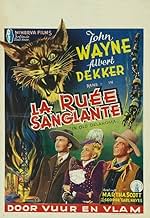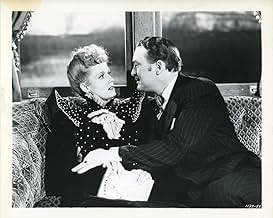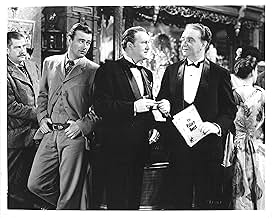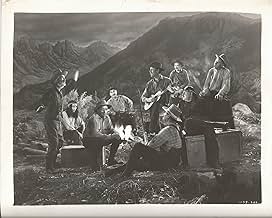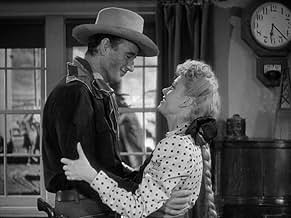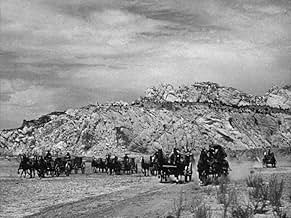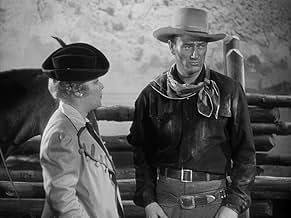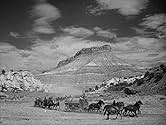IMDb रेटिंग
6.3/10
1.7 हज़ार
आपकी रेटिंग
अपनी भाषा में प्लॉट जोड़ेंIn 1906, on Oklahoma's Indian lands, a cowboy fights for oil lease rights against a greedy oilman while a pretty schoolteacher steals both men's hearts.In 1906, on Oklahoma's Indian lands, a cowboy fights for oil lease rights against a greedy oilman while a pretty schoolteacher steals both men's hearts.In 1906, on Oklahoma's Indian lands, a cowboy fights for oil lease rights against a greedy oilman while a pretty schoolteacher steals both men's hearts.
- निर्देशक
- लेखक
- स्टार
- 2 ऑस्कर के लिए नामांकित
- 2 कुल नामांकन
Foncilla Adams
- Girl
- (बिना क्रेडिट के)
Stanley Andrews
- Mason - Indian Agent
- (बिना क्रेडिट के)
Charles Arnt
- Joe - Train Conductor
- (बिना क्रेडिट के)
फ़ीचर्ड समीक्षाएं
This film is also very commonly known as "War of the Wildcats". As you watch it, the movie sure looks like a B--but with just a bit more polish, a bit longer running time and a bit more in the way of budget. This is because the film is sort of like a transitional film for Wayne. While he played in a ton of Bs during the 1930s, around 1939 (with "Stagecoach") he began playing in better and better films. But many of them looked a lot like Bs and felt a lot like Bs. His bigger budget studio projects were still a few years ahead.
The film begins with a feminist author (Martha Scott) leaving her tiny town. Apparently the local prudes were angry at her writing such a scandalous romance novel--and you get the impression that it really isn't THAT bad. In fact, it really can't be because Scott is a school teacher and never really lived a worldly life in this town. So, at the urging of the women, she is determined to see the world--and be more like one of her characters. But, she is conflicted and isn't quite sure where to go or what to do. Her dull old aunt wants her to live with her in Kansas City--but when she meets a big-time oil man (Albert Dekker), he convinces her to follow him to the oil fields and promises her wealth and excitement. There are two problems with this. First, Dekker is a bit of a pig and an ego-maniac. Second, John Wayne pops into her life--and back then he was a major hunk. And, since he was the star, it's not especially surprising where it all ends. In the middle portion of the film, Wayne and Dekker vie for power and fight over oil land that the Indians are willing to lease. But Dekker is determined not to play nicely--and seems willing to use some dirty tricks to make sure he alone gets these leases.
Overall, this is not an especially deep film nor is it very realistic. However, it is fun--and that is very important. Gabby Hayes and especially Marjorie Rambeau provide some fun support and color.
The film begins with a feminist author (Martha Scott) leaving her tiny town. Apparently the local prudes were angry at her writing such a scandalous romance novel--and you get the impression that it really isn't THAT bad. In fact, it really can't be because Scott is a school teacher and never really lived a worldly life in this town. So, at the urging of the women, she is determined to see the world--and be more like one of her characters. But, she is conflicted and isn't quite sure where to go or what to do. Her dull old aunt wants her to live with her in Kansas City--but when she meets a big-time oil man (Albert Dekker), he convinces her to follow him to the oil fields and promises her wealth and excitement. There are two problems with this. First, Dekker is a bit of a pig and an ego-maniac. Second, John Wayne pops into her life--and back then he was a major hunk. And, since he was the star, it's not especially surprising where it all ends. In the middle portion of the film, Wayne and Dekker vie for power and fight over oil land that the Indians are willing to lease. But Dekker is determined not to play nicely--and seems willing to use some dirty tricks to make sure he alone gets these leases.
Overall, this is not an especially deep film nor is it very realistic. However, it is fun--and that is very important. Gabby Hayes and especially Marjorie Rambeau provide some fun support and color.
One of Poverty Row studio Republic's intermittent big-budget efforts, War of the Wildcats is a lively, if fairly routine, western notable for its early 20th-century setting. Wayne plays Daniel F. Somers, formerly one of Teddy Roosevelt's rough riders, who finds himself entangled in a love-and-oil battle with Albert Dekker. Wayne is fairly amiable here, representing the old west and the little man forced to adapt in the face of modern technology and the dawn of big business. Dekker, of course, represents this future. He drives one of them new-fangled auto-mobeels and is erecting oil wells just as fast as he can. He is also dismissive of the native population he even has one, a Cherokee, scrub his back as he takes a bath while Wayne shows them respect and receives it in return. I'm not quite sure how that stacks up today, given our knowledge that the treatment of the native American by the old west fell somewhat short of what can be considered fair.
Anyway, possibly the best aspect of this film is that Dekker's character isn't portrayed as an out-and-out villain, driven only by greed. He is smart and relatively sophisticated, and also brave. Anyone who has ever had the experience of working with or for a 'captain of industry' (for want of a better term) or a self-made man, will probably recognise oilman Gardner's characteristics exactly as those that account for the success of these people. They aren't necessarily bad people, just ruthless enough to do whatever is necessary in pursuit of their goals.
Martha Scott is a fairly bland heroine it's difficult to see why such rugged individuals as Somers and Gardner would both be so keen to bed her. Gardner's frankness in this matter is also refreshing given the times in which this film was made. He makes no secret of what he desires from Catherine and doesn't resort to any particular underhand tactics to make his desires come true. Of course, he doesn't succeed it would be another quarter of a century before Hollywood would allow a character like Jim Gardiner to win the girl (and the oil).
Anyway, possibly the best aspect of this film is that Dekker's character isn't portrayed as an out-and-out villain, driven only by greed. He is smart and relatively sophisticated, and also brave. Anyone who has ever had the experience of working with or for a 'captain of industry' (for want of a better term) or a self-made man, will probably recognise oilman Gardner's characteristics exactly as those that account for the success of these people. They aren't necessarily bad people, just ruthless enough to do whatever is necessary in pursuit of their goals.
Martha Scott is a fairly bland heroine it's difficult to see why such rugged individuals as Somers and Gardner would both be so keen to bed her. Gardner's frankness in this matter is also refreshing given the times in which this film was made. He makes no secret of what he desires from Catherine and doesn't resort to any particular underhand tactics to make his desires come true. Of course, he doesn't succeed it would be another quarter of a century before Hollywood would allow a character like Jim Gardiner to win the girl (and the oil).
This was Republic's most successful picture of 1943, offering solid if unspectacular entertainment.
It is a somewhat unusual western, being set in the early 20th century and featuring an antagonist (played by Albert Dekker) who is a ruthless businessman rather than the conventional evil villain. Dekker represents modernity and Wayne, of course, the more traditional hard moral man.
The two male leads compete for the heart of a romance writer played by Martha Scott, and for the oil rights of the Indian territory, with Wayne representing a much less predatory way of doing business.
Add some humor and lively action scenes and you get a quite enjoyable product, if a bit formulaic.
It is a somewhat unusual western, being set in the early 20th century and featuring an antagonist (played by Albert Dekker) who is a ruthless businessman rather than the conventional evil villain. Dekker represents modernity and Wayne, of course, the more traditional hard moral man.
The two male leads compete for the heart of a romance writer played by Martha Scott, and for the oil rights of the Indian territory, with Wayne representing a much less predatory way of doing business.
Add some humor and lively action scenes and you get a quite enjoyable product, if a bit formulaic.
I didn't expect much from this one but it's better than it has any right being. On the surface it looks like an ordinary, run-of-the-mill B western with cowboy John Wayne leading a revolt against greedy oil baron Albert Dekker. Oh and the obligatory pretty school teacher Martha Scott, who catches the eye of both Wayne and Dekker. But it's actually a fun little movie that captures your attention and never drags. Wayne and Dekker play their white hat/black hat parts well, and Scott is charming with a nice chemistry with Duke. Supporting cast features greats like Gabby Hayes, Marjorie Rambeau, and Paul Fix. And just wait until Teddy Roosevelt shows up. That was my favorite part.
This a John Wayne film like no other. Take it from a huge fan that's seen most of his movies. Although this not classified as a comedy, the Duke's turns in a sly performance full of great one-liners and facial expressions that had me rolling. Its action adventure in the oil fields and it's very entertaining and fun. Wayne is Cowboy Dan Somers and he competes with oilman Jim Gardner for oil lease rights on Indian land in Oklahoma, as well as for the attentions of schoolteacher turned scandalous book author Cathy Allen. It has a good supporting cast including George "Gabby" Hayes. You will never see the Duke quite like this in any other role. If you're a fan of the Duke, you will love this film. It was originally titled "In Old Oklahoma" and then reissued as "War of the Wildcats".
क्या आपको पता है
- ट्रिवियाSidney Blackmer made a career out of playing Teddy Roosevelt. He played him eight times in various film projects. 1-"This Is My Affair" (1937) 2-"The Monroe Doctrine" (1939) 3-"Teddy the Rough Rider" (1940) 4-"March On, America!" (1942) 5-"In Old Oklahoma" (1943), 6-"Bill "Buffalo Bill" (1944) 7-"My Girl Tisa" (1948) 8-"Never Kick a Man Upstairs" (TV Movie) (1953).
- भाव
Bessie Baxter: We've got a long way to go, and a short time to get there.
- कनेक्शनEdited into Six Gun Theater: In Old Oklahoma (2021)
टॉप पसंद
रेटिंग देने के लिए साइन-इन करें और वैयक्तिकृत सुझावों के लिए वॉचलिस्ट करें
- How long is In Old Oklahoma?Alexa द्वारा संचालित
विवरण
- चलने की अवधि
- 1 घं 42 मि(102 min)
- रंग
- पक्ष अनुपात
- 1.37 : 1
इस पेज में योगदान दें
किसी बदलाव का सुझाव दें या अनुपलब्ध कॉन्टेंट जोड़ें

